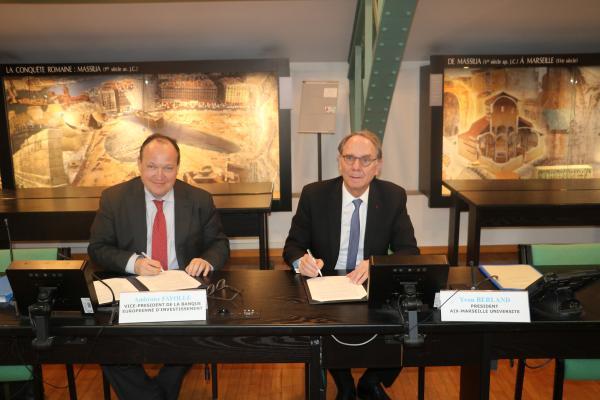
On 3 March 2017, a new step was taken to extend and modernise Aix Marseille University (AMU): AMU President Yvon Berland and European Investment Bank (EIB – the EU bank) Vice-President Ambroise Fayolle signed a finance contract worth EUR 127m. The contract has particularly favourable financial terms owing to the Bank's triple-A rating, making it possible to optimise and consolidate the entire finance plan for the AMU campus investments.
A memorandum of understanding between the two parties – the first of its kind in France – was signed in 2014, after AMU was chosen from among the 13 French universities selected for the Campus Plan. This demonstrates the EIB's strong commitment to supporting this university and the Plan as a whole, for which it has mobilised EUR 1.3bn.
This EU financing will support the “Operation Campus - Aix-Marseille University” development programme, including the renovation and modernisation work for the “Luminy” campus in Marseille and the “Aix Faculties District” campus in Aix-en-Provence.
It is a major project that will completely transform student life by redeveloping buildings and capacity, and by improving teaching, research and service provision conditions: 76 000 students across the various AMU campuses stand to benefit. The new layout will provide modern, structured, high-profile, scientifically consistent and renovated sites built to international standards in order to help as many students as possible to meet the challenge of higher education and enhance their employability in a context of international competition.
AMU President Yvon Berland said: “The modernisation and attractiveness of Aix Marseille University rest upon the close links we have built with our socioeconomic partners, enabling us to bring our campuses up to international standards.”
“This financing is a strong signal of our action to help young people,” added EIB Vice-President Ambroise Fayolle during the signing ceremony. “It is our responsibility to provide universities with the means to develop and modernise in order to train and attract talent. This will make them more competitive at a European and international level. In doing this, the EU bank is helping young people from lower secondary school to university, giving them the best opportunities to train, find work and therefore succeed professionally.”
The Pauliane eco-campus: a first in France!
This EU financing will also secure the final operation of the Campus Plan: the construction of the Pauliane eco-campus in the south of Aix-en-Provence, which has already been granted high environmental quality ("HQE") status. The aim of the “HQE Development" approach is to implement operations in harmony with their locations, where environmental impacts are assessed throughout the project life cycle and are controlled as much as possible, promoting economic and social development and quality of life.
In partnership with the Provence-Alpes-Côtes-d’Azur (PACA) Region, the City of Aix-en-Provence, the Regional Teaching Authority (Rectorat) and the Regional University and School Services Centre (Centre Régional des Oeuvres Universitaires et Scolaires - CROUS), the eco-management faculty will move into the Pauliane site. The aim is to bring together all of Aix's economics and management research and teaching (excluding the IAE Business Administration Institute) onto a single site. The Pauliane site – which covers more than 3 ha – was chosen for the renovation and/or construction of seven operations connected to the creation of the new eco-campus:
- Redevelopment of the site's exterior (City of Aix-en-Provence)
- Redevelopment on the site itself (AMU and CROUS)
- Teaching and administration building (AMU)
- MEGA building, research centre (AMU)
- Student accommodation (CROUS)
- University library (AMU)
- Canteen (CROUS)
This financing is fully consistent with the EIB's priority action to promote the education and training of young people. On 3 March 2017, the EIB also signed a EUR 250m operation for renovation and modernisation in the PACA Region. This priority represented overall investment of EUR 705m in 2016.


